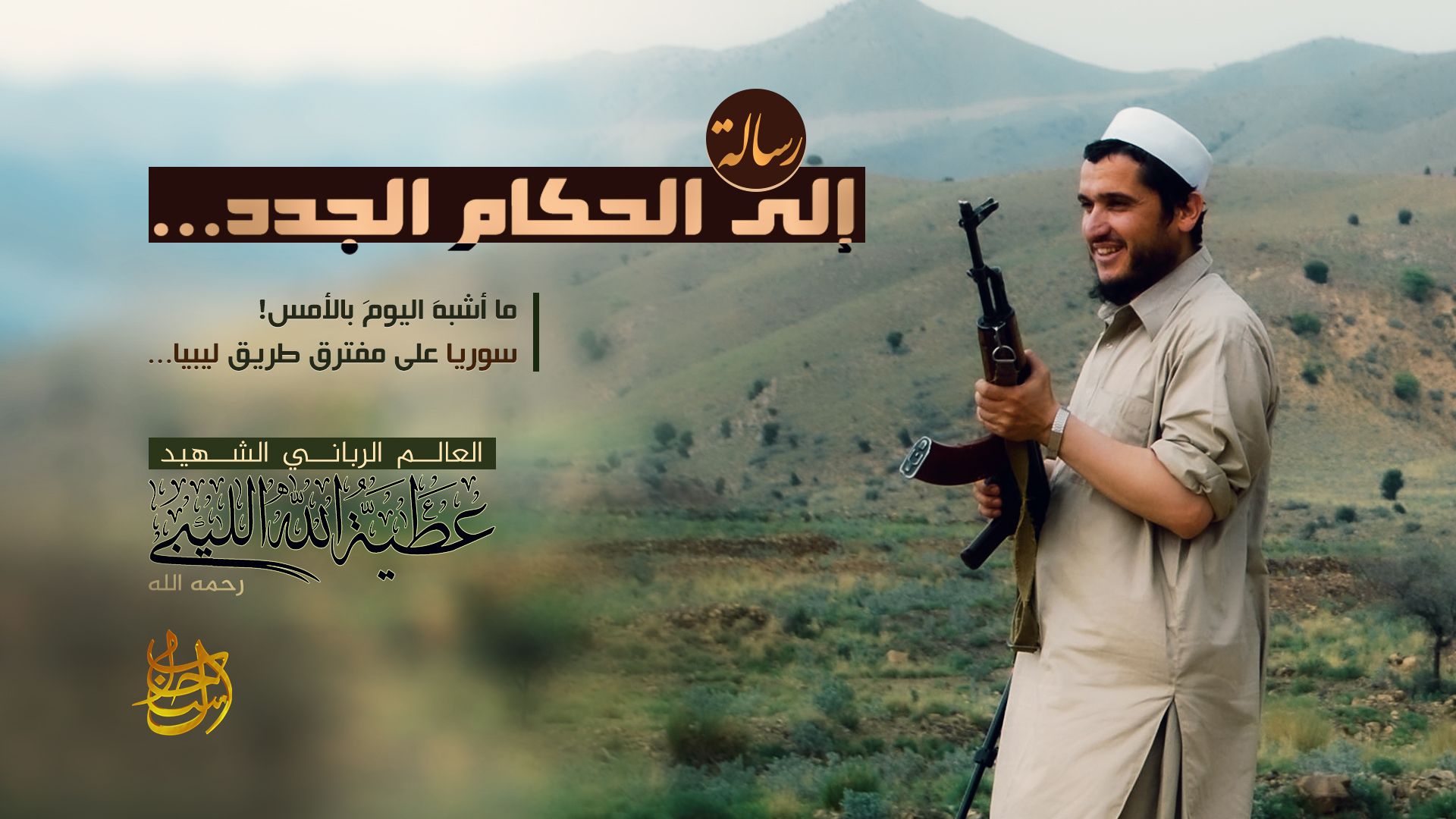
Click the following link for a safe PDF copy: East Turkistān Islamic Party — On Members of the Group Joining the Syrian Army
________________
Source: Telegram

Click the following link for a safe PDF copy: East Turkistān Islamic Party — On Members of the Group Joining the Syrian Army
________________
Source: Telegram

Examining the Islamic State’s administrative and bureaucratic apparatus, activities, and how they affected the daily life of local and foreign residents living under Islamic State rule in al-Raqqah between 2013 and 2017.
Click here to read the paper.

Nearly six months after the fall of the Assad regime, Syria’s new government faces immense challenges following fourteen years of civil war. One key issue is the ongoing threat posed by the Islamic State of Iraq and the Levant (ISIL) and al-Qaeda, both a domestic security concern and a test of the Interim Government’s (IG) credibility in the eyes of Western powers. The US-led Global Coalition has spent nearly a decade combating ISIL in Syria and continues to target al-Qaeda operatives. If Damascus can demonstrate competence in countering these groups, it may ease international concerns rooted in the IG leadership’s past ties—having broken with ISIL in 2013 and al-Qaeda in 2016. The current leadership, once part of Jabhat al-Nusrah and later Hayat Tahrir al-Sham (HTS), has now been unaffiliated with ISIL for twelve years and al-Qaeda for nine.
Click here to read the rest.

For the first time since the fall of the Assad regime, the Islamic State successfully struck the new Syrian government, targeting a security post in the eastern town of Mayadin with a May 18 car bomb attack that left five dead. Intentionally or not, the strike coincided with several other significant developments in the Syria file—it came one day after government forces clashed with an IS cell in Aleppo (the first such sting operation since March), less than a week after President Trump met with President Ahmed al-Sharaa in Riyadh, and subsequent to a U.S. military drawdown in Syria that began in mid-April. Although the local IS presence is nowhere near as strong as it once was, the trend lines point to a persistent threat that cannot be ignored.
Click here to read the rest.
Click the following link for a safe PDF copy: Shaykh Abū Muḥammad al-Maqdisī — How Can Someone Who Refuses To Implement Islamic Law and Chooses Man-Made Laws Not Be An Infidel? Is His Jihādī History An Obstacle to Takfīr?
_________________
Source: Twitter
To inquire about a translation for this fatwā for a fee email: [email protected]
• قبل الفتح -فتح سوريا الشام- كان الهدف الجامع الذي يعمل الجميع تحته ولأجله بوضوح هو: (تحرير سوريا، والوصول إلى دمشق، وإسقاط منظومة البعث والأسد الإجرامية).
وقد منّ الله علينا بتحقق هذا الهدف، فله سبحانه الحمد والمنّة على ذلك، وعلى كل نعمه وآلائه التي لا حصر لها ولا عدّ.
• واليوم؛ يتساءل كثيرون -بعد الفتح- عن الهدف الجامع مجددًا.
ولا شك أن الإجابة على هذا السؤال، بالشكل الذي يحوّله إلى هدف حقيقي عملي يمثّل مظلة جامعة، ليس أمراً سهلاً؛ إذ يحتاج تفكيراً ومطارحةً جادّة، كما يحتاج أناةً ودقة، واستحضاراً لحجم التحديات، وموازنةً بين الجغرافيا والتاريخ.. (جغرافيا سوريا الحالية وتاريخ الأمة).. بين الممكن المستطاع والمأمول الاستراتيجي؛ إن على صعيد سوريا أو المنطقة أو الأمة..
• ولعلّ بقية المنشور تسهم في وضع اللبنة الأولى في الإجابة على هذا السؤال، إن كانت هذه البقية بمجموعها تمثّل مقاربةً صائبة، أو تثير الاهتمام للمطارحة والمناقشة على أقل تقدير، إن كان فيها بعض ما ليس بصواب.
فأقول ناسباً أي خطأ لنفسي مستغفراً منه:
يمكن اقتراحاً القول: إن هدفنا الجامع بعد إسقاط منظومة الأسد وتحرير سوريا هو:
(بناء سوريا)
بناء سوريا مادياً ومعنوياً:
– مادياً ببناء العمران والاقتصاد، وسائر جوانب الحضارة المادية.
– ومعنوياً بـ بناء الإنسان؛ فكرياً وقيمياً وتربوياً وأخلاقياً وإيمانياً. وهذا النوع من البناء هو حقيقة الحضارة وجوهرها.
وهو الأساس والغاية، التي يأتي البناء المادي وسيلةً لخدمتها وتحقيقها.
فنحن -الذين عشنا في منطقة كانت تظلها الحضارة الإسلامية- لنا ما يميّزنا، حتى وإن انحسرت حضارتنا مادياً، لأن الانحسار المادي لا يعني أن نستبدل قيمنا ومبادئنا ونذوب في غيرنا.
ومما يميزنا في هذا السياق؛ تصورنا للكون والحياة وغاية الوجود، المنطلق من قيمنا وتراثنا وديننا، حيث ترتبط الدنيا بالآخرة ارتباطاً مفاهيمياً وثيقاً.. هذا التصور الذي ينبغي أن يلقي بظلاله في عموم المجالات، والأهداف والوسائل والغايات، والآليات والسياسات.
• وإذا كان الفرد منا يرتبط بثلاثة أنواع من العلاقات؛
– علاقته بربه وخالقه، ومكوّنه ومبدعه، ومبدعِ كل شيءٍ من حوله.
– وعلاقته بذاته ونفسه، وأحاسيسه ومشاعره، وضميره وأناه.
– وعلاقته بالخلق من حوله، وسنن هذا الخلق وخصائصه؛ الاجتماعية في العاقل منه، والكونية فيما سوى ذلك.
• وإذا كان ثمة ضرورة للتنبه إلى كلٍّ من الكينونات التالية: (الفرد – المجتمع – الدولة) وطبيعة ونوع تشابك وتداخل العلاقات بينها.
فإننا نستطيع القول: ينبغي أن يكون هدفنا هو بناء (الفرد – المجتمع – الدولة) المنضبط في علاقته مع (ربه – نفسه – الخلق من حوله) بناءً مادياً ومعنوياً وفق ما تم التنويه له، وبتوازنٍ منضبط بين مستويات العلاقة؛ علوّاً ودنوّاً.. وقرباً وبعداً.. وبحسب الأهمية؛ الأهم فالمهم، ودون إغفال ضرورة التموضع الصحيح لسوريا ضمن خط الانتماء للأمة وحضارتها.
• ما سبق يستلزم ضرورة وجود المرجع الحاكم لنا في كل ذلك، ومهما تحدثنا عن الدساتير الحاكمة والقوانين الضابطة، فعلينا أن لا نغفل عن تراثنا ومميزاتنا وقيمنا الأصيلة أثناء استعارتنا من إيجابيات الآخرين، وأن لا نغبن فنأخذ بعض السلبيات نحسبها إيجابيات.
• وإن تراثنا الفقهي والتشريعي -في هذا السياق- قد بيّن لنا بوضوح من خلال ثنائية: (فروض الأعيان – فروض الكفايات) وهي منظومة متكاملة؛ كيف يمكننا أن نحقق هدفنا الجامع المقترح: (بناء سوريا)..
فبعد أداء الفرد منا لفروض الأعيان العبادية الواجبة عليه تجاه خالقه ومولاه؛ يمكننا البناء المادي والمعنوي، من خلال نظام فروض الكفايات التعبدي، وفق المسارات الأربعة التالية المقترحة:
١- الدعوة إلى الله، ونشر الدين وتبليغه للناس، وتعليمهم أحكامه.
٢- تنمية المجتمع، وخدمة الإنسان فيه، بما يصلح أحواله في حياته وبعد مماته، وبما يجعله مستقراً (الأمن) ومعافىً (الصحة)، ودفع كل الأسباب المفضية للحرج والمشقة.
٣- تقوية سوريا وتوحيدها، وصناعة هيبتها، والدفاع عنها، وتحصينها مادياً ومعنوياً ضد أعدائها، وجهادهم والتغلب عليهم ودفع صائلتهم. وكل ذلك مع استصحاب أهمية موضعة سوريا ضمن سياق الأمة، قدر الطاقة وبحسب المستطاع.
٤- الإحسان إلى المحتاجين، ونجدة المتضررين والمنكوبين، والعمل على تخفيف آثار الجوائح والحروب والتهجير والنزوح، ومنع الفوضى حال اضطراب المجتمعات.
• ويمكننا لتحقيق تلك المسارات تشكيل كل المؤسسات اللازمة (التشريعية والقانونية والعسكرية والأمنية والدينية والسياسية والاقتصادية والثقافية والتعليمية والإعلامية…) مع التشبيك المجتمعي المناسب، بحيث يتكامل دور كل من الفرد والمجتمع والدولة، وفق التصور الذي رسمه ديننا، وبما يحقق سعادة الناس في دينهم ودنياهم وآخرتهم.
• وللعلم؛ فباب فروض الكفايات؛ منهجيةٌ علميةٌ وطريقة تفكير، يحتاجها الناس في معاشهم وصلاحهم وسائر شؤون حياتهم. وهو باب عظيم في إصلاح أحوال الناس ونهضة الأمم وتطوير المجتمعات واستقرار البيوت ونماء الأخلاق وحراسة الدين وصد المعتدين، إن نحن طبّقناه بنيّة التعبّد لله رب العالمين.والحمد لله..
_________________
Source: Telegram
To inquire about a translation for this release for a fee email: [email protected]

_________________
Source: Telegram
To inquire about a translation for this video message for a fee email: [email protected]

_______________
Source: Telegram
To inquire about a translation for this video for a fee email: [email protected]

_______________
Source: Telegram
To inquire about a translation for this video for a fee email: [email protected]

______________
Source: Telegram
To inquire about a translation for this video for a fee email: [email protected]